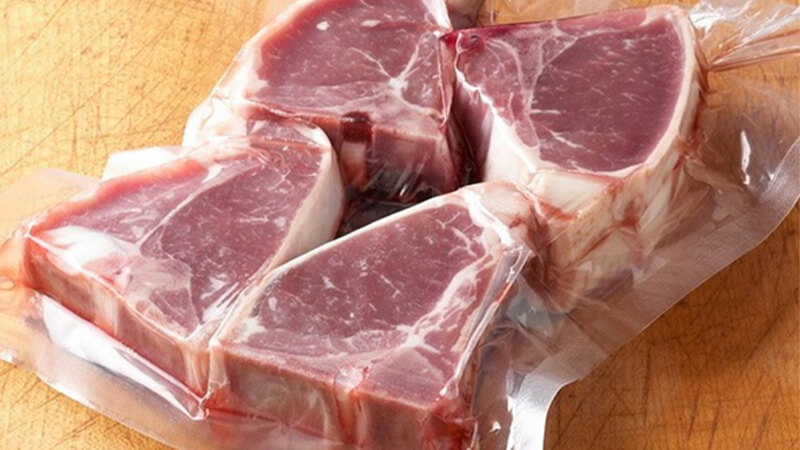Many homemakers use refrigerators and spices to simply and effectively preserve different types of meat. Fresh meat, when stored in a refrigerator for less than three days, tends to become tough and lose its moisture. Read on to discover useful tips on how to properly store various types of meat.
1. Tips for Storing Pork
It is recommended to use plastic bags or airtight containers to store pork in the refrigerator. These bags or containers create a barrier that limits bacterial growth and helps maintain the quality of the meat.
 Use plastic bags to tightly seal the pork before placing it in the refrigerator
Use plastic bags to tightly seal the pork before placing it in the refrigerator
You can also use common cooking spices such as garlic, shallots, pepper, and salt to preserve pork. These spices have antibacterial properties and can effectively extend the shelf life of the meat. This method is simple and convenient as these spices are readily available in your kitchen.
 Use common cooking spices to preserve pork
Use common cooking spices to preserve pork
2. Tips for Storing Beef
When storing beef in the refrigerator, avoid washing it beforehand as this can cause freezing and make the meat mushy. Instead, wrap the beef in multiple layers of plastic wrap to minimize freezing and prevent the raw beef odor from permeating other foods.
 Properly store beef in the refrigerator
Properly store beef in the refrigerator
Beef is often expensive and nutrient-rich, so it would be a shame if it spoils or doesn’t taste good. If this happens, try this tip: you can keep beef soft and fresh for up to a month by using olive oil. Simply coat the beef with a thin layer of olive oil and store it in an airtight container in the refrigerator.
 Use olive oil to preserve beef
Use olive oil to preserve beef
3. Tips for Storing Chicken
Chicken is a versatile and nutritious protein source that can be used in various dishes. However, it has a high risk of bacterial contamination if not properly stored.
Storing Chicken in the Refrigerator
To store chicken in the refrigerator, clean it thoroughly, pat it dry, and then wrap it tightly in plastic wrap. The refrigerator contains various other foods that can cause odors to transfer to the chicken if it is not properly sealed. It is recommended to use 2-3 layers of plastic wrap. For longer storage, place the wrapped chicken in the freezer section of your refrigerator, and it will be ready to use after thawing.
 Use 2-3 layers of plastic wrap before placing the chicken in the refrigerator
Use 2-3 layers of plastic wrap before placing the chicken in the refrigerator
Storing Chicken Without a Refrigerator
To store chicken without a refrigerator, start by cleaning it and letting it air dry. Keep the chicken in a cool, well-ventilated area, using a mesh cover or netting to protect it from dust, flies, and mosquitoes. You can also marinate the chicken with salt and other spices to prevent spoilage and unpleasant odors.
4. Tips for Storing Fresh Fish
Storing Fish in the Refrigerator
Proper storage of fish in the refrigerator is crucial to maintain its nutritional value and ensure food safety. For fresh fish, clean it thoroughly, cut it into manageable portions, and then place it in sealed containers or plastic bags before freezing.
Fish tends to stay fresher longer if purchased when it is very fresh, as the bacterial growth process is slower compared to that of slightly spoiled fish. Therefore, proper storage is more accessible, and the fish will remain fresh for an extended period. When storing fish, you can use common spices such as ginger, shallots, and alcohol (e.g., rice wine or vodka) to prevent spoilage and reduce any unpleasant fishy odor.
 Use common spices to preserve fish
Use common spices to preserve fish
These are all the tips and tricks you need to know to keep your pork, chicken, beef, and fish fresh and tasty for an extended period. We hope you found this article helpful and can apply these techniques in your kitchen.
Unlocking the Simple Solution to Combatting Odors of All Types of Meat
 Meat‘>
Meat‘>In order to ensure that your meat-based dishes not only taste great, but also do not give off any unpleasant odor, it is essential to find ways to deodorize popular meats such as beef, pork, chicken, and fish.




































